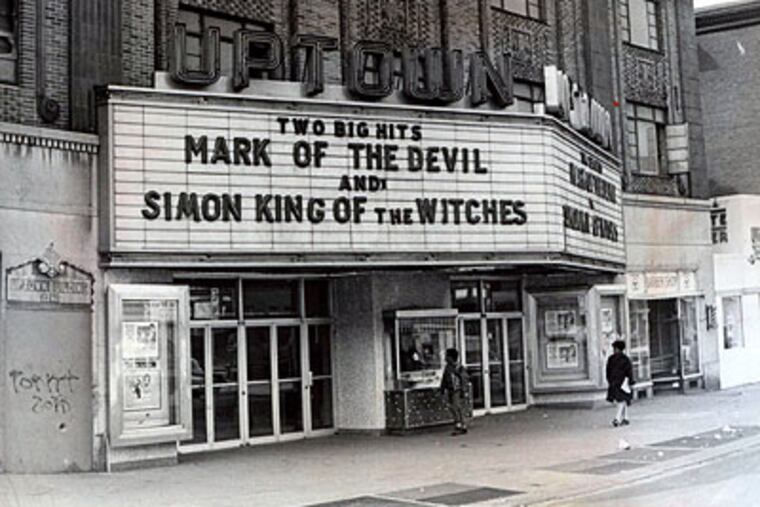Uptown Theater history recounted by Motown star
When singer Kim Weston recalls the Uptown Theater, she remembers making a stunning entrance in a beautiful skintight gown that brought the crowd to a frenzy in the early 1960s.

When singer Kim Weston recalls the Uptown Theater, she remembers making a stunning entrance in a beautiful skintight gown that brought the crowd to a frenzy in the early 1960s.
"I started singing behind the curtain," said Weston, who had hit records on the emerging Motown label.
"When they finally opened up the curtains, somebody in the audience yelled, 'Oh my God, how much for the dress?' " Weston said. "That young man and I grew to be good friends."
Weston, who in 1966 recorded the iconic hit duet "It Takes Two" with Marvin Gaye and had solo records as well, was sharing her recollections Thursday with students in a Temple University class devoted to the historic Uptown and another class focused on Motown Records.
The singer spoke to about 50 people, mostly students - some young, others old enough to be grandparents - inside the Charles L. Blockson Afro-American Collection at Temple's Sullivan Hall.
Weston, 71, one of the less visible stars at Motown during its heyday, told the audience about her triumphs in the music business despite being overshadowed by other divas such as Diana Ross, Mary Wells, and Martha Reeves.
Wearing wire-rimmed glasses and a painted denim jacket adorned with rhinestones and glitter, Weston captivated the crowd with wit and irony.
"They told me there was going to be a bunch of little kids here," Weston joked. "Isn't it wonderful, people come to class early?"
Weston recorded singles such as "Helpless" and 1963's "Love Me All the Way." Her top solo record was 1965's "Take Me in Your Arms (Rock Me a Little While)."
"I was in the second Motown Review when I played the Uptown," Weston said. "I loved the Uptown."
She said she also loved the city. "Philadelphia has always been very special," said Weston, who lives in Detroit. "Philly and New York are very close as far as the audiences and their response."
Weston recalled meeting the late Georgie Woods, who produced many of the famous R&B shows at the Uptown, in the 2200 block of North Broad Street.
She also remembered meeting disc jockeys Jimmy Bishop, Jocko Henderson, Hy Lit, and Jerry Blavat, "the Geator with the Heater."
"It was a time when DJs played the records they liked and got paid for it," Weston said.
She said Blavat was just coming into his own and was "like a water boy."
"One of the biggest compliments I ever had was from Jerry Blavat when he told me that I treated him like a human being instead of a gofer," Weston said.
Weston said Martha and the Vandellas' 1964 anthem "Dancing in the Streets" was actually written for her. Her then-husband, William "Mickey" Stevenson, an A&R man for Motown, wrote it. They later divorced.
She said that at Motown, the artist who had the prior hit record would get the next great song, noting that Martha and the Vandellas had previously released "(Love Is Like a) Heat Wave."
"Martha had had 'Heat Wave,' which was a big hit and so everyone was vying for the next record by her," Weston said.
"So my ex-husband took the record that I was doing and gave it to Martha. She sang it line for line, note for note. ... The next time I heard 'Dancing in the Streets,' Martha was singing it on the air."
Weston said she and Stevenson left Motown in the late 1960s. She recorded with MGM and other labels but never regained her Motown luster.
Bryant Simon, a professor of history and director of American studies at Temple who developed the three-credit course, "Sounds of Revolution: Rhythm and Blues as Heard and Experienced at the Uptown Theater, 1959 to 1970," hailed Weston's visit.
"Almost point for point, she was making points we made in class about the product of Motown," Simon said. "It was great. People were listening.
Weston's comments about the Uptown were spot-on, he said. "She was telling them all the stuff we were talking about in class."
Linda Richardson, president of the nonprofit Uptown Entertainment and Development Corp., said work to restore the theater was continuing, as was fund-raising.
"We're planning to develop a partnership with an entertainment organization to run the theater based on our vision of providing entertainment for youth in the community," Richardson said in a telephone interview. She said information about the theater restoration can be found at www.philadelphiauptowntheater.org
Weston said she is still making music. She performed recently in England, but said her career was slowed when she was struck by a shuttle bus in Burbank, Calif., in 2000. "It knocked me 15 feet in the air," she said.
Weston said one of the highlights of her career came in 1970, when she recorded a cover of "Lift Every Voice and Sing," also known as the Black National Anthem.
But it wasn't for Motown.
"Motown never got into political issues," she said. Berry Gordy Jr., the founder of Motown, "didn't want to get into that."